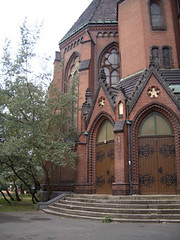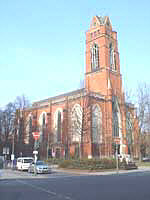I've just come back from a ride on my littlest brother's bike to the Volkspark and around Rathaus Schöneberg. It was cloudy -- some clouds were even sooty grey -- and drops of rain fell every now and then. I wasn't so sure if I was allowed to ride the bike on the nice, broad sidewalks (or on which parts thereof), so I followed the example of others as much as I could and also walked beside the bike for a while. J.'s bike is not at all a city one and a bit too small for me, and I was wearing a helmet, and I was going slowly (probably with the wrong gear) so I felt rather rustic but also rather amused.
I woke up quite late this morning -- perhaps even around eleven o'clock. I attribute this fact to the weather, because I probably rely on the sun to wake me up at the appropriate early hour. Breakfast was nice, though I did have to stir a pot of milk when Ge. grew tired of it, with Gi. looking on and making pleasant conversation but not helping!
Then I read bits of a
Knight of Spain by Marjorie Bowen. I didn't read it all the way through, because in the course of my broad reading in sentimental literature at gutenberg.org, I've discovered that sentimental books are as likely as any other to make one feel dissatisfied and uneasy, if one gets into them too much. A nice, sane beginning can be followed by two decent chapters, then be overwhelmed by some unpleasant subjective mood of the author, so that the rest of the book drags one down into a weird, depressing, aimless place where one doesn't want to be. So, if in doubt, I skip ahead to the end. It isn't just about happy endings. There are sad endings that fit, too -- like the death of Prince Andrei in
War and Peace, or Rebecca not being married to the "eponymous hero" (who doesn't seem good enough for her anyway, not being particularly intelligent or independent-minded) of Ivanhoe. There was one gutenberg book about a Scottish nobleman who falls in love with an English actress, where she mutates from a nice woman into a she-devil by the end of the book, and he ends up kidnapping her and forcing her to sink with him in a boat out in a storm. And the woman, according to the author, deserved this. All I got out of it was that the author had serious issues with women (especially actresses), partly because he didn't understand them at all, and that he was a vindictive and humourless man. Anyway, the
Knight of Spain was decent. It was based on the life of Don Juan, half-brother of King Felipe of Spain, and at one point governor of the Spanish Netherlands. It was nice to encounter Anne of Austria and other well-known figures again, though I was disgusted by the unflattering portrait of Queen Marguerite (wife of Henri IV; much more nicely represented in Alexandre Dumas's book
La Reine Margot, as far as I read it).
This book also tied into Nancy Mitford's
Madame de Pompadour, which I am also reading. I think it must be awfully difficult to figure out what people were like based on written evidence. Up until about a year ago I thought that one can easily discern and describe the characters of others. Now I've had too many surprises to trust at least my own insight any more; also, taking myself for an example, people can be, so to speak, different people at different times, and one can't reconcile them into one central vision. Anyway, I admire the authoritative tone of Nancy Mitford's representations of what people were like, did, and said, even though I would prefer to know that everything that she writes is the absolute truth. This book also ties in to my History course last year, while giving a completely different perspective, which I also like.
Yesterday I also read
Merde Encore, a funny compilation of French argot. I did find bits of it somewhat shocking (being the uptight Anglo-Saxon that I am), and I don't absolutely believe in the summaries of the French character given in it, but it greatly lightened my mood and it also served as a warning to be very careful what I say in French.
Now it is the lunch break, or I would probably be playing the piano now. I've worked out a new system. First of all I play the piano part of the Haydn Trio Hob. XV: 25, because the Presto movement makes my fingers work very hard, and serves as an excellent warm-up, and because it sounds like a morning song and I like it very much. Then I play finger exercises (actually intended for beginners), followed by scales (tonic scales, arpeggios, dominant seventh chords and arpeggios, diminished seventh chords and arpeggios, formula pattern scales, and chromatic scales; one key -- like C major -- per day). After that I sightread something. Lately it's been Händel's Suite No. 5 in E major. It's not too difficult, though I haven't figured out where the melody lies in the confusing parts yet, and I was pleasantly surprised to discover the Harmonious Blacksmith and its variations in the Andante with variations at the end of it. I also play masses of other music including Schumann's
Kinderszenen every evening, a handful of Mendelssohn's
Songs without Words, Mozart and Beethoven sonatas (always the first page or so, until I'm too lazy to continue), short children's pieces by Prokofieff, Chopin mazurkas, some funny sonatinas by a Charles Dennée, Brahms waltzes, short pieces by Bach, and the repertoire albums for RCM grades 5 to 8. If I'm in the right frame of mind I get into the mood and sometimes even the times in which these pieces were written, and it's a lovely sort of escapism.
But, in spite of all this, I often worry about what I will do in future. At first the coming of the grand piano made me feel better, but my doubts remain. At present I have a low opinion of my abilities as an author, particularly because I still can't reconcile the books I most like to read and the world view that most appeals to me with the present times. This is probably because I am stodgy and in some ways snobby. I can't write about the past with authority because I don't know what it was like to live then, though I can form conjectures based on the piles of old fiction I've read, and I can't write about the present with authority because I refuse to understand it, and because I haven't the energy or the self-confidence to go out and live it. As for fantasy, I've never really liked it without an anchor to reality, and I don't feel like writing things for young people because I don't understand them either. Altogether I think I'm too unformed to write something worthwhile publishing. Of course all these doubts will vanish the moment I have inspiration in some form or other, but this inspiration can take weeks or months to appear.
I wonder how good my piano playing is according to objective criteria. I'm not sure if I could play in public, because I always play badly when nervous, but I've sometimes found that if someone does come and listen, I don't lose concentration at all, whereas I often lose concentration if I
think someone might be listening. It's all wrapped up with my large unsteady ego. Anyway, I could study music if I really am good, and with proper practising and many technical exercises I could much reduce the likelihood of a meltdown, and increase the lowest common denominator in my playing.
As for university, that's a whole other kettle of fish. I read recently that six students apply for every available position at the Freie Universität, which caused me to despair, and also to wonder whether, if I did get in, I would be excluding someone else who needs or wants to get in more. My marks would also, I think, exclude me from most other universities. The Berlin Kolleg apparently requires that one have worked for at least three years. I saw an advertisement in the newspaper for people to volunteer in Africa after six months' training, and I've been thinking of doing that. I just need to look up the websites.
Anyway, this is all so confusing, and I feel ashamed of my laziness, and I feel awfully under pressure to do something or be a failure for the rest of my life. And whenever I have time to think, I always explore new and wondrous lands in self-doubt, making everything worse. To clarify, I'm not sad or depressed, just anxious and bothered and fearful and unsure of myself.
But I think my thoroughly teenager-ish outbreak can profitably end here. : ) How delightful it is to vent without boring an unfortunate listener nearly to tears! I hope the readers of my blog are aware of the scrolling-down option . . .


 A view of the Kammergericht building at the Kleistpark (nearly across the street from us)
A view of the Kammergericht building at the Kleistpark (nearly across the street from us)